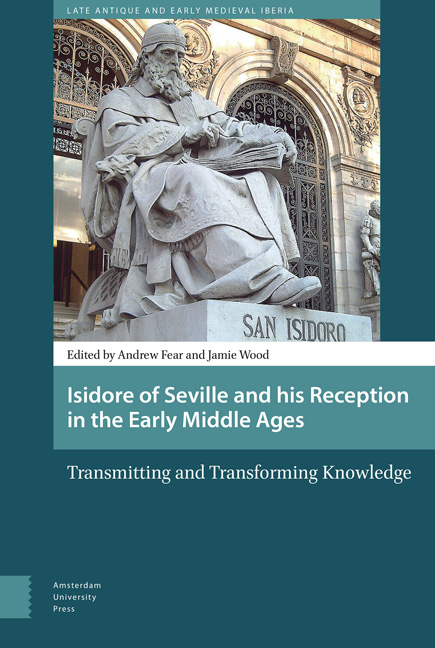 Isidore of Seville and his Reception in the Early Middle Ages
Isidore of Seville and his Reception in the Early Middle Ages Book contents
- Frontmatter
- Contents
- Preface: Paul Fouracre, University of Manchester
- 1 Introduction
- 2 A Family Affair: Leander, Isidore and the Legacy of Gregory the Great in Spain
- 3 Variations on a Theme: Isidore and Pliny on Human and Human-Instigated Anomaly
- 4 Putting the Pieces Back Together: Isidore and De Natura Rerum
- 5 The Politics of History-Writing: Problematizing the Historiographical Origins of Isidore of Seville in Early Medieval Hispania
- 6 Isidorian Texts in Seventh-Century Ireland
- 7 Isidore of Seville in Anglo-Saxon England: The Synonyma as a Source of Felix’s Vita S. Guthlaci
- 8 Hispania et Italia: Paul the Deacon, Isidore, and the Lombards
- 9 Rylands MS Latin 12: A Carolingian Example of Isidore’s Reception into the Patristic Canon
- 10 Adoption, Adaptation, & Authority: The Use of Isidore in the Opus Caroli
- Abbreviations
- Index
8 - Hispania et Italia: Paul the Deacon, Isidore, and the Lombards
Published online by Cambridge University Press: 12 December 2020
- Frontmatter
- Contents
- Preface: Paul Fouracre, University of Manchester
- 1 Introduction
- 2 A Family Affair: Leander, Isidore and the Legacy of Gregory the Great in Spain
- 3 Variations on a Theme: Isidore and Pliny on Human and Human-Instigated Anomaly
- 4 Putting the Pieces Back Together: Isidore and De Natura Rerum
- 5 The Politics of History-Writing: Problematizing the Historiographical Origins of Isidore of Seville in Early Medieval Hispania
- 6 Isidorian Texts in Seventh-Century Ireland
- 7 Isidore of Seville in Anglo-Saxon England: The Synonyma as a Source of Felix’s Vita S. Guthlaci
- 8 Hispania et Italia: Paul the Deacon, Isidore, and the Lombards
- 9 Rylands MS Latin 12: A Carolingian Example of Isidore’s Reception into the Patristic Canon
- 10 Adoption, Adaptation, & Authority: The Use of Isidore in the Opus Caroli
- Abbreviations
- Index
Summary
The jurist and philologist Friedrich Lindenbrog's (1573-1648) edition of Diversarum gentium historiae antiquae tres – published in 1640 and dedicated to Johann Friedrich (1579-1634), the Archbishop (administrator) of Bremen and Bishop of Lubeck – associated three authors who provided histories of the origins and migrations of peoples. Lindenbrog collated three authors in this work: first, the De Regnorum ac temporum successionibus of Jordanes (better known as the Historia Romana); three items of Isidore of Seville; and a De Gestis Longobardorum, better known as the Historia Langobardorum of Paul the Deacon.
It is not entirely surprising that Lindenbrog should collect these writers and their works in one volume. His note to the readers emphasises the connections between the origins of the ‘Germans’ and the relevance of the works of Jordanes, Isidore and Paul as materials for the early histories of their peoples. At the same time, Isidore of Seville and Paul the Deacon embody authors who not only delineate the origins of the gens upon which they write but also, through their works, assist in shaping the ethnic constructions that we term Visigoth and Lombard. As they composed their histories, we see the processes that have been termed ethnogenesis begin to crystallise so that both social (peoples, power) and spatial zones (geography) coalesce. Where previously in the late sixth-century both Visigothic and Lombard kings had endeavoured to perpetuate political, socio-economic and cultural hegemony over populations of Hispano- and Italo-Romans by the enforcement of legal separation, both kingdoms began to mould a territorial identity which encompassed, commanded and acquired the loyalties, or at least aimed to do so, of all the inhabitants under their rule.
How the situation on the ground affected the context and content of the narratives of both Isidore and Paul the Deacon has been the subject of considerable recent interest and debate. Whilst the influence of Gregory of Tours, for instance, on Paul's Historia Langobardorum (hereafter HL) has been acknowledged, and the inspiration provided by both the examples of Jordanes and Bede in prompting Paul to compose a general work of history on the Lombards has been identified, the influence of Isidore at significant junctures in Paul's work and thought have not been sufficiently addressed.
- Type
- Chapter
- Information
- Isidore of Seville and his Reception in the Early Middle AgesTransmitting and Transforming Knowledge, pp. 159 - 176Publisher: Amsterdam University PressPrint publication year: 2016
